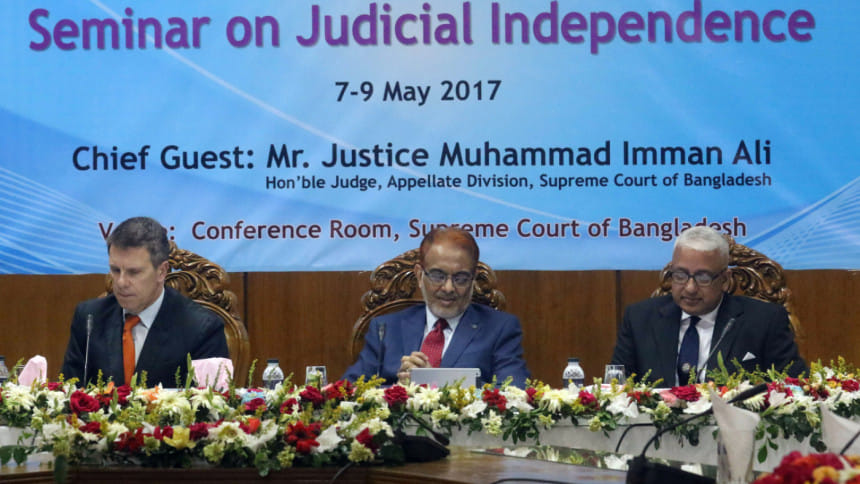Judges must be free from worries

Judges must be free from all worries to ensure justice and the maintenance of the rule of law, Justice Muhammad Imman Ali, a judge of the Appellate Division of the Supreme Court, said yesterday.
“I would venture to suggest that independence of a judge is the sine qua non of any justice delivery system. Equally important is the public perception that the judiciary is independent,” he said, while speaking as the chief guest at the inauguration of a three-day seminar on judicial independence held in the capital.
The Supreme Court of Bangladesh, the Commonwealth Secretariat, and the Commonwealth Magistrates' and Judges' Association jointly organised the seminar at the Supreme Court conference room participated by some 40 lower court judges of the country.
Justice Imman Ali said truly independent judiciary is one that has full autonomy in the decision-making process, subject only to the bounds prescribed by the law and the constitution.
“An impartial judge is one who sees only the evidence and materials before him and decides the issues, weighing the submissions of the learned advocates, in the light of applicable law. A judge must be able to make her/his decision in any given case freely and impartially based on the facts and law involved, without fear or favour. The judge must be able to protect the rights of the citizen in accordance with the law without having to look over his/her shoulders and without feeling any pressure or interference from other sources, specially the government,” he observed.
The apex court judge said an independent judiciary is the key to upholding the rule of law in a free, democratic society, and true democracy is dependent on the existence of the rule of law.
Mark Guthrie, legal adviser to Commonwealth Secretariat, said judicial independence is enshrined in Bangladesh's constitution.
“It is important because without judicial independence you cannot have democracy, the rule of law, human rights including freedom of expression, the right to fair trial, freedom of association, the right to peaceful assembly, the right to a private life, the right to property, the right to freedom from torture, the right to life -- all of which if upheld lead to the fulfillment of human aspiration, social and economic development and good governance,” he added.
Judge Shamim Qureshi, director of programmes, Commonwealth Magistrates' and Judges' Association, also spoke.

 For all latest news, follow The Daily Star's Google News channel.
For all latest news, follow The Daily Star's Google News channel. 



Comments